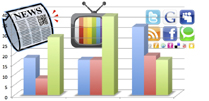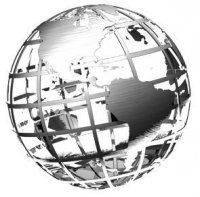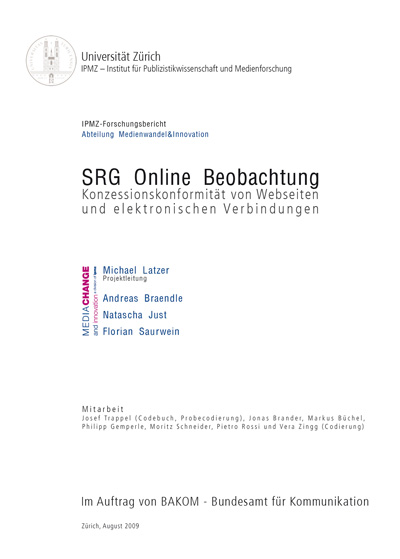News
-
New Research Project: Country profiles of media usage: comparing traditional and new media
8th June 12 The Media Change & Innovation Division has started the research project „Country profiles of media usage: comparing traditional and new media“. The project is carried out on behalf of the Swiss Federal Department of Foreign Affairs (FDFA).
The Media Change & Innovation Division has started the research project „Country profiles of media usage: comparing traditional and new media“. The project is carried out on behalf of the Swiss Federal Department of Foreign Affairs (FDFA).The transition to the information society brings about new challenges for collective actors and their communication strategies. How can target groups be addressed adequately under the conditions of media change, convergence, crosslinking, channel multiplication and audience fragmentation? Which channels are suitable for reaching a mass audience and how can the comparatively narrow segment of social multiplicators and decision-makers be reached?
The project analyses the media structures for political communication in selected countries with strong relevance for Swiss foreign affairs. The analyses center on the question of the efficiency of old and new communication channels for collective actors’ communication purposes. To this end, the analysis compiles basic data regarding the outreach, usage and attributed credibility of selected media channels and outlets.
For more details check the project's webpage
-
Die Schweiz im Internet – Neuer Themenbericht zu Vertrauen und Sorgen bei der Internet-Nutzung
22nd May 12 WIP-CH veröffentlicht erneut Daten zur Internet-Nutzung in der Schweiz: Die Ergebnisse des Themenberichts „Vertrauen und Sorgen bei der Internet-Nutzung in der Schweiz“ zeigen ein geringes Vertrauen der Internet-Nutzer in nutzergenerierte Inhalte, Sorgen vor der Kontrolle durch Unternehmen und einen erheblichen Anteil an Leuten, die sich manchmal aufgrund von Medienkonsum im Haushalt unbeachtet fühlen.
WIP-CH veröffentlicht erneut Daten zur Internet-Nutzung in der Schweiz: Die Ergebnisse des Themenberichts „Vertrauen und Sorgen bei der Internet-Nutzung in der Schweiz“ zeigen ein geringes Vertrauen der Internet-Nutzer in nutzergenerierte Inhalte, Sorgen vor der Kontrolle durch Unternehmen und einen erheblichen Anteil an Leuten, die sich manchmal aufgrund von Medienkonsum im Haushalt unbeachtet fühlen.Themenbericht Vertrauen und Sorgen bei der Internet-Nutzung in der Schweiz
Weitere verfügbare Themenberichte:
- Themenbericht Internetverbreitung und digitale Bruchlinien in der Schweiz
- Themenbericht Internet und Politik in der Schweiz
- Themenbericht Internet-Anwendungen und deren Nutzung in der Schweiz
-

Neue Daten zur Internet-Nutzung in der Schweiz veröffentlicht: Der Themenbericht „Internet-Anwendungen und deren Nutzung in der Schweiz“ liefert detaillierte Nutzungsdaten zu über 40 Internet-Anwendungen, von E-Mail über Online-Shopping bis hin zu Social Media.
Themenbericht Internet-Anwendungen und deren Nutzung in der Schweiz
Weitere verfügbare Themenberichte:
- Themenbericht Internetverbreitung und digitale Bruchlinien in der Schweiz
- Themenbericht Internet und Politik in der Schweiz
-

Die Schweiz hat 2011 erstmals am World Internet Project teilgenommen und die Schweizer Bevölkerung zu ihrer Internet-Nutzung und ihren Einstellungen zum Internet befragt.
Nun sind erste Themenberichte verfügbar. Diese widmen sich der Internetverbreitung, der digitalen Kluft und digitalen Demokratisierung sowie Fragen zu Meinungsfreiheit und Internetpolitik.
- Themenbericht Internetverbreitung und digitale Bruchlinien in der Schweiz
- Themenbericht Internet und Politik in der Schweiz
-
Die Schweiz im Internet 2011
16th November 11 Einladung zur Projektpräsentation: Die Schweiz im Internet 2011
Einladung zur Projektpräsentation: Die Schweiz im Internet 2011Wie wird das Internet in der Schweiz genutzt und wer nutzt es nicht? An welchen Bruchlinien verläuft die Digitale Spaltung? Wie steht es um das Vertrauen in das Internet und um das Verhältnis Internet und Politik? Gefährdet das Web traditionelle Medien wie das Fernsehen?
Diese und viele weitere Themen werden im World Internet Project (WIP) behandelt, einer vergleichenden Langzeitstudie, die in mittlerweile 30 Ländern die Verbreitung und Nutzung des Internet im internationalen Vergleich erfasst und soziale, politische und ökonomische Implikationen der Netzentwicklung analysiert.
Die Abteilung Medienwandel & Innovation des IPMZ – Institut für Publizistikwissenschaft und Medienforschung der Universität Zürich ist seit kurzem der Schweizer Länderpartner des WIP und hat soeben die erste WIP-Erhebung in der Schweiz durchgeführt.
Aus diesem Anlass werden der Leiter und Gründer des World Internet Project, Prof. Jeff Cole, Direktor USC Annenberg School Center for the Digital Future, Los Angeles, und der Leiter des WIP Schweiz, Prof. Michael Latzer, WIP-Ergebnisse zur Diskussion stellen.
Jeff Cole, einer der weltweit führenden Internetforscher, spricht an dieser Veranstaltung über Trends, Fads & Transformation: The Impact of the Internet.
Drawing on ten years of data and insights from a worldwide study in 30 countries, Jeffrey Cole will separate myth from reality as he describes how the Internet and mobile technology are changing the fabric of daily life.
Michael Latzer präsentiert anschliessend Die Schweiz im Internet 2011, Ergebnisse zur Verbreitung, Nutzung und Einschätzung des Internet aus der erstmals durchgeführten Schweizer WIP-Befragung.
Zeit: Dienstag, 29. November 2011, 18:30–20:00 Uhr
Ort: Universität Zürich, Rämistrasse 71, 8006 Zürich, Raum KOL-G-217
Wir laden Sie herzlich zu dieser Veranstaltung ein und freuen uns, wenn Sie bei Vorträgen, Diskussion und anschliessendem Apéro riche dabei sind! Ein Flyer liegt bei.
Für Rückfragen steht Ihnen Dr. Natascha Just, n.just@ipmz.uzh.ch, gerne zur Verfügung.
Das World Internet Project Switzerland wird vom Bundesamt für Kommunikation (BAKOM) und vom Dekanat der Philosophischen Fakultät der Universität Zürich unterstützt.
-
The Division on Media Change & Innovation of the IPMZ continues the monitoring and assessment of the SRG Internet offer in 2010. The project SRG Online Assessment 2010 is commissioned by the Swiss regulator BAKOM as part of its Media Research 2010 special focus on the continuous program analysis of television, radio and online offers of the SRG. The study’s focus is–in replication of its 2009 analysis–on the extent of compliance of the SRG online services with the regulatory requirements of the charter (e.g., relation of online offers to broadcasts, no commercial links). It builds on a methodological approach, which has been developed and applied for the SRG Online Assessment 2009 and conducts a content analysis to give insights into the structure and functioning of the websites of five SRG enterprise units, and a link analysis to capture the intensity of electronic linking and the pattern of interconnection with other websites. The replication of the analysis will show first trends of development and change.
For more information see the project website. Results will be available by the end of 2010.
-
The Division on Media Change & Innovation participates as country expert in a study that analyzes the independence and efficiency of European regulatory authorities for audiovisual media. The study was contracted by the European Commission to an international research consortium under the direction of the Hans-Bredow-Institut für Medienforschung. Further consortium partners are: Katholieke Universiteit Leuven, Central European University, Cullen International, and Perspective Associates.
A network of country experts cooperates with the consortium and provides the data from 43 countries covered by the study (EU member states, candidate and potential candidate countries to the EU, EFTA countries as well as selected other countries).
The overall aim of the study is the development of indicators that allow the measurement of independence of regulatory bodies in the field of audiovisual media as well as the assessment of these bodies’ functioning to ensure an effective application of the AVMS Directive.
The Division on Media Change & Innovation of the IPMZ contributes to the study with the analyses of independent regulatory authorities in Switzerland and Austria.Find more information on the Project Page
-

Michael Latzer is part of an international research group that investigates the options for using the Digital Dividend in Austria. Other members are Arne Boernsen (AB Consulting), Tim Braulke (Infront Consulting & Management) and Joern Kruse (Helmut-Schmidt University, Hamburg). The study is commissioned by the Austrian regulator RTR and will assess different usage scenarios and develop policy recommendations for this highly contended issue.
The Digital Dividend, a product of digitalisation and convergence in the communications sector, denotes those frequencies that are freed up as a result of the switchover from analogue TV to more spectrally efficient digital TV. The digital dividend spectrum is suitable for a wide range of potential uses. The political decision of if and how this valuable freed up spectrum is used for mobile communication (e.g. broadband internet) and/or for broadcasting (e.g. HDTV) is heavily debated worldwide.
More
-
SRG Online Assessment for BAKOM
15th September 09Online services of public service broadcasters in Europe are disputed because they are in direct competition with online activities of private broadcaster and publishers. While the discussions are similar across European countries, the regulatory responses by national governments differ. In Switzerland a charter lays down the conditions for the online activities of the Swiss public broadcaster (SRG) and clarifies what kind of content is permissible. The Division on Media Change & Innovation conducted a research project commissioned by the Swiss regulator BAKOM to assess the SRG’s compliance with these regulatory requirements. For this endeavor we have (1) developed an analytical approach for the external assessment, and conducted (2) a content analysis to give insights into the structure and functioning of the websites of five SRG enterprise units, and (3) a link analysis to capture the intensity of electronic linking and the pattern of interconnection with other websites (link structure). The paper shows the potential of the developed analytical tools and the extent to which the SRG websites comply with regulatory requirements.
Get the full research report here

